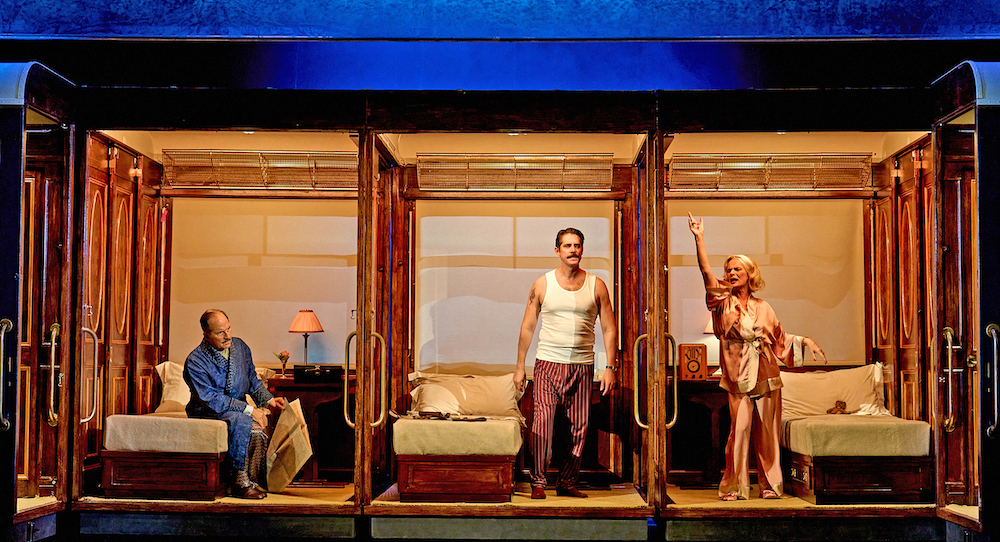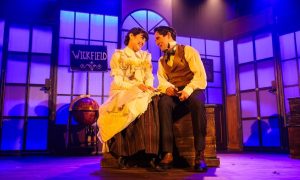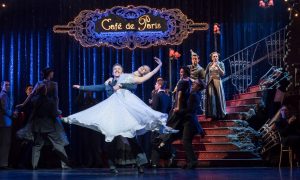Theatre Royal Brighton, East Sussex.
24 April 2025.
I had never seen the film or read the book prior to watching today’s murder mystery, and so I watched the action unfold fresh and oblivious to the identity of the culprit. Theatre Royal in Brighton is traditional and intimate, and felt entirely appropriate for Agatha Christie’s Murder on the Orient Express, set in 1934. A more modern or plain theatre would not have created the same ambience.
The production was presented by Fiery Angel in association with Agatha Christie Limited, Fiery Dragons, Richard Batchelder and Tilted, and was adapted for the stage by Ken Ludwig.
Immediately arresting was the choreographed movement. The way the cast, particularly when all onstage together, moved, positioned and repositioned themselves in shapes and patterns as dialogue progressed was visually interesting, drew the audience in, and contributed to the pace, particularly in the build up to the crux.
The production opened with the main cast walking slowly across the empty stage as a tight knit pack. They swayed as though with the movement of the train, and the mood was dark and ominous, casting questions from the outset.
Michael Maloney played the infamous Hercule Poirot winningly and had the audience in the palm of his hand from the outset. Humour was laced attractively throughout, visually and through dialogue, sometimes more subtly than others. The audience thoroughly enjoyed being entertained and gasps and giggles were frequent.
Some gorgeous comical moments included Christine Kavanagh as Helen Hubbard, dancing around her cabin to the radio, using cupboards and doors as percussion and disrupting neighbouring passenger and soon-to-be murder victim Samual Ratchett in the next cabin; Princess Dragomiroff played by Debbie Chazen expressing her continual exasperation over anxiety-ridden Greta Ohisson (Rebecca Charles) and nonchalantly accepting the return of her handkerchief found at the murder site, having previously hotly denied ownership of it. And the friendship between Poirot and his friend, business owner, Monsieur Bouc (Bob Barrett) which rose to almost farcical and raucous heights towards the end.
The ingenious set design undeniably played a pivotal role in the success of this production. Designer Mike Britton created a train carriage that separated, joined together again, and was visible from all sides, thanks to the large turntable centre stage and the smooth movements of the ensemble team operating it. It was thrilling and absorbing for the audience as the carriage was continually moved around to present conversations in the corridor, through the carriage windows and inside the cabins. Actors created realism swaying onboard with the movement of the train and squeezing past one other in the narrow confines.
The turntable was also used effectively prior to departure on the Orient Express as a café in the railway station. An ideal platform on which to introduce characters who sat at tables, ordered from the menu and interacted with one another, all viewed by the continually suspicious and alert Hercule Poirot, also seated. As the turntable rotated, different viewpoints of the café conversations were possible, encouraging information gathering which came thick and fast.
A screen above the train, running the width of the stage, provided depth and atmosphere using light and shadow, for example, a snowstorm, and a suspicious character in silhouette. There was a lot of incidental and scene-changing music which contributed positively to the humorous, dramatic or tense mood of the moment. There was a lot to look at, and perhaps to help your mind forget that the hunt for a murderer was on. If that was intentional, it worked well.
The heated showdown as Poirot delivered his speech unravelling the mystery was exciting and included flashback moments involving different characters as he replayed certain events relating to the murder. There was delicious confusion, too, as one person and then another was highlighted or brought forward on the stage and the audience led to believe that they were the culprit, only for Poirot to go racing ahead with yet another revelation.
“The law must be obeyed, or we become barbarians.”
Once the mystery had been solved, which I hadn’t guessed, and felt had equal components of both satisfaction and slight disappointment; the way different characters had behaved, been portrayed and moved both alone and together, hit differently and gave pause for thought after the show had finished.
Murder on the Orient Express featured a talented team and was a fabulous way to spend an afternoon.
By Louise Ryrie of Dance Informa.












